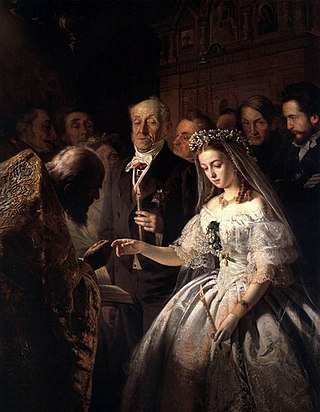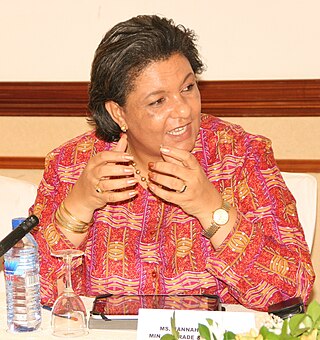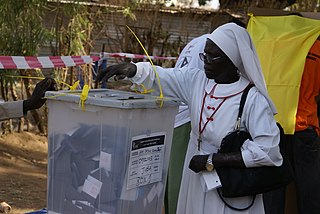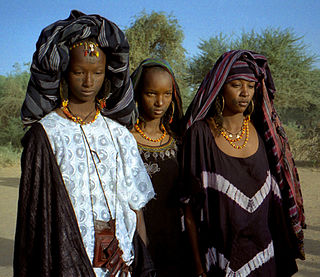Child marriage is a marriage or domestic partnership, formal or informal, between a child and an adult, or between a child and another child.

Lesbian, gay, bisexual, and transgender (LGBT) people in the Democratic Republic of the Congo (DRC) face discrimination and legal challenges not experienced by non-LGBTQ residents. Same-sex sexual activity is legal for both males and females in the Democratic Republic of the Congo, although LGBT individuals may still be targeted for prosecution under public indecency provisions on occasion.

Forced marriage is a marriage in which one or more of the parties is married without their consent or against their will. A marriage can also become a forced marriage even if both parties enter with full consent if one or both are later forced to stay in the marriage against their will.

Primary education in the Democratic Republic of the Congo (DRC) is not free or compulsory.
Widow inheritance is a cultural and social practice whereby a widow is required to marry a male relative of her late husband, often his brother. The practice is more commonly referred as a levirate marriage, examples of which can be found in ancient and biblical times.

The Kivu conflict is an umbrella term for a series of protracted armed conflicts in the North Kivu and South Kivu provinces in the eastern Democratic Republic of the Congo which have occurred since the end of the Second Congo War. Including neighboring Ituri province, there are more than 120 different armed groups active in the eastern Democratic Republic of Congo. Currently, some of the most active rebel groups include the Allied Democratic Forces, the Cooperative for the Development of the Congo, the March 23 Movement, and many local Mai Mai militias. In addition to rebel groups and the governmental FARDC troops, a number of national and international organizations have intervened militarily in the conflict, including the United Nations force known as MONUSCO, and an East African Community regional force.

The status of women in Ghana and their roles in Ghanaian society has changed over the past few decades. There has been a slow increase in the political participation of Ghanaian women throughout history. Women are given equal rights under the Constitution of Ghana, yet disparities in education, employment, and health for women remain prevalent. Additionally, women have much less access to resources than men in Ghana do. Ghanaian women in rural and urban areas face slightly different challenges. Throughout Ghana, female-headed households are increasing.

Women in the Democratic Republic of the Congo have not attained a position of full equality with men, with their struggle continuing to this day. Although the Mobutu regime paid lip service to the important role of women in society, and although women enjoy some legal rights, custom and legal constraints still limit their opportunities.

Estimates of sexual violence are surveys of victims of sexual violence crime that have been undertaken to estimate the prevalence of sexual violence. The prevalence of sexual violence differs from the reported sexual violence statistics according to the law enforcement agencies due to the dark figure of crime. The surveys use a common methodology to aid comparability.
Criticisms of marriage are arguments against the practical or moral value of the institution of matrimony or particular forms of matrimony. These have included the effects that marriage has on individual liberty, equality between the sexes, the relation between marriage and violence, philosophical questions about how much control can a government have over its population, the amount of control a person has over another, the financial risk when measured against the divorce rate, and questioning of the necessity to have a relationship sanctioned by government or religious authorities.

The Democratic Republic of the Congo, and the east of the country in particular, has been described as the "Rape Capital of the World", and the prevalence and intensity of all forms of sexual violence has been described as the worst in the world. Human Rights Watch defines sexual violence as "an act of a sexual nature by force, or by threat of force or coercion", and rape as "a form of sexual violence during which the body of a person is invaded, resulting in penetration, however slight, of any part of the body of the victim, with a sexual organ, or of the anal or genital opening of the victim with any object or other part of the body."
Arranged marriage is a type of marital union where the bride and groom are primarily selected by individuals other than the couple themselves, particularly by family members such as the parents. In some cultures, a professional matchmaker may be used to find a spouse for a young person.
The Democratic Republic of the Congo is a country located in central Africa.
The Democratic Republic of the Congo (DRC) ratified the 2000 UN TIP Protocol in October 2005.
According to UNICEF, child marriage is the "formal marriage or informal union before age 18", and it affects more girls than boys. In Afghanistan, up to 57% of girls are married before they are 19. The most common ages for girls to get married are 15 and 16. Factors such as gender dynamics, family structure, cultural, political, and economic perceptions/ideologies all play a role in determining if a girl is married at a young age.

Child marriage in India, according to the Indian law, is a marriage where the woman and man both are younger than 21 years of age respectively. Most child marriages involve women, many of whom are poor socio-economic conditions.
Prostitution in the Democratic Republic of the Congo is legal but related activities are prohibited. The Congolese penal code punishes pimping, running a bawdy house or brothel, the exploitation of debauchery or prostitution, as well as forced prostitution. Activities that incite minors or promote the prostitution of others have been criminalised. The government does little to enforce the law. During the colonial era and the years that followed independence, the Ministry of Health issued calling cards identifying professional sex workers and provided them with medical health checks. However, this system was abandoned in the 1980s. Public order laws are sometimes used against sex workers. Street prostitutes report harassment, violence and extortion from the police. UNAIDS estimated there are 2.9 million sex workers in the country.

Women in South Sudan are women who live in and are from South Sudan. Since the Independence of South Sudan on 9 July 2011, these women have gained more power but still face issues of inequality. Many women in this area do not have adequate access to health resources and education. While these women often face inequality, there has been progress since South Sudan's official declaration of independence. In recent years, this inequality has gained national attention and people have become more interested in the issue of child marriage that this area faces. Along with this, there has started to be a focus on the very high level of maternal mortality in South Sudan. With a maternal mortality rate of 789 deaths per 100,000 live births, South Sudan has one of the highest rates in the world.

Women in Niger are women that are from or live in the West African country of Niger. These women belong to a population in which 98% are practitioners of Islam. Laws adopted by the government of Niger to protect the rights of Nigerien women are most often based on Muslim beliefs.

Child marriage is a marriage or union between a child under the age of 18 to another child or to an adult. Child marriage is common in a multitude of African countries. In South Sudan, child marriage is a growing epidemic. Child marriage in South Sudan is driven by socioeconomic factors such as poverty and gender inequality. Current figures state that South Sudan is one of the leading countries in the world when it comes to child marriage. Child marriage has negative consequences for children, including health problems and lower education rates for South Sudanese girls. Many initiatives have been taken to combat child marriage in South Sudan, but the presence of societal norms and instability continues to drive its presence in the nation.












